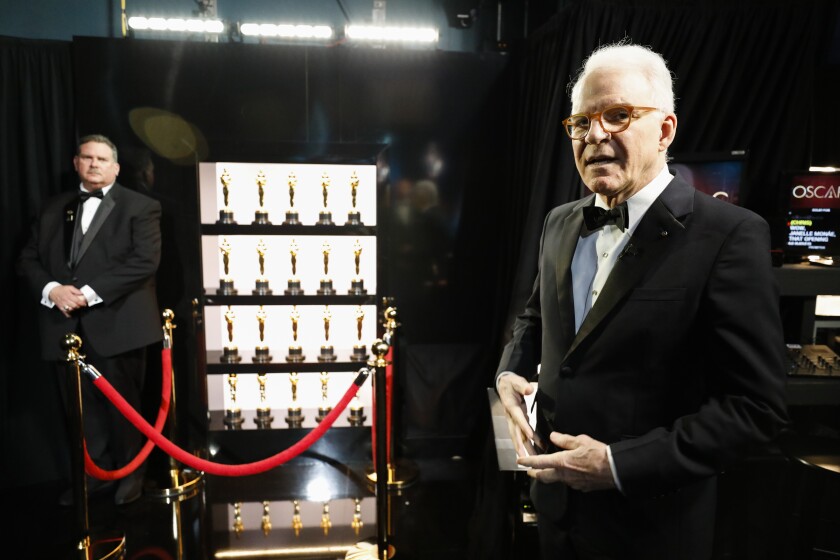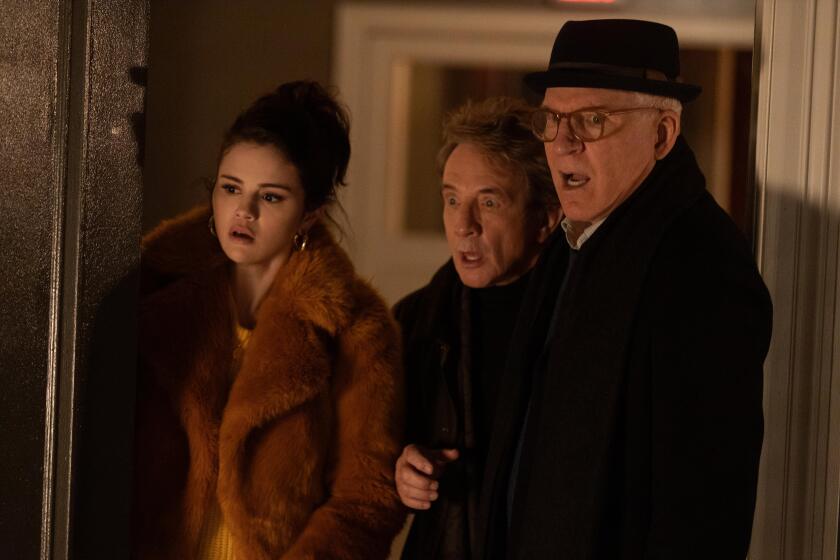The unabashed romanticism of “L.A. Story,” which is 30 years old this year, comes directly from the worldview of its writer and star, Steve Martin. He was raised in the shadow of LAX, falling in love with magic and performance at venues around Los Angeles — and even theme parks. So rather than simply skewering the excesses of his hometown in “L.A. Story,” he looked under the surface to find its heart.
No one quite knew what to make of the movie when it was released in 1991, but time has been kind to a film now considered part of Los Angeles film history. A vision that blends magical realism, romantic comedy and even Shakespeare with a voice that could only be Martin’s, “L.A. Story” is finally getting a Blu-ray release Nov. 9, followed by a live table read of the script presented by Film Independent on Nov. 13.
Martin discussed the inspiration for the film, its big heart, modern comedy and the smash success of his latest series, Hulu’s “Only Murders in the Building.”
The film finds joy and optimism under the surface of Los Angeles. Where does that come from?
I think, at heart, I am extremely sentimental. Hopefully, that’s a good thing. And romance has always meant a lot — the magic of romance. L.A. was not really that romantic to me, but over time I understood that it has these secret locales — we even used them in the movie — these beautiful Moroccan courtyards in the middle of Hollywood. It’s a city of charm if you pick and choose where you go. The idea came when I’m driving down a freeway and I saw these freeway signs and thought, “What if it spoke to me?” The city was helping me. The idea that they were all interconnected — not God-like, but guru-like — it inspired me to think romantically about the city.
How did L.A. define your career and who you were at the time?
Everything early on in my career that was good happened in L.A., or at least Southern California. There was Knott’s Berry Farm, where I first was onstage for three years, from 18 to 21. There was Long Beach State College, which so changed my thinking. I’m not saying it was a highfalutin education, but I was studying a lot and it made me question everything. I can start over. You can trash everything you know and try to build it up anew.
Then there was the Troubadour, with all these young artists — Linda Ronstadt, the Eagles, etc. There was essentially no comedy scene. The Comedy Store came much later. There weren’t really places to perform like that, which was actually good for me. I wasn’t around other comedians. There were clubs in Orange County and Los Angeles. And there was driving, which was already romantic. You could get in your car and go somewhere. And, also, of course, CBS Television, where I got my job with “The Smothers Brothers.”

Presenter Steve Martin backstage at the 92nd Academy Awards on Feb. 9, 2020, at the Dolby Theatre in Hollywood.
(Al Seib / Los Angeles Times)
All of this affected my comedy, but the real effect, the biggest influence, I think on “L.A. Story,” the story of “L.A. Story,” was poignant Irish music. When I was getting big in stand-up comedy, I was very isolated, driving around. I had a road manager, and I loved Irish music. I was a banjo player and I loved Irish music on the banjo, and I loved minor melodies. And I think it’s a part of melancholy. There was one particular song besides all the songs that had this kind of romantic melancholy called “The Maid of Coolmore.”
As I was formulating the story for “L.A. Story” — meaning the elements like L.A. and the parody side — I was also formulating the romantic story side. The song tells the story of a man in Ireland, in Coolmore, and he passes a young woman three times. The first time he passes her, he just thinks how lovely she is. They look at each other. The second time, they talk to each other. But the third time he passes her, she says, “Goodbye,” and he says, “Why?” She says, “Because I’m sailing away to America,” which a lot of Irish people did in the late 19th century. And he says, “If I had the power on the day that she is to sail I would turn the winds around.” Which is what happens in “L.A. Story.” The weather and L.A. conspire to stop her from leaving.
You said earlier this year that “the real story of a movie isn’t written for 10 years,” so what’s the real story of this movie after 30? Are there are other films in your history where you feel like the story changed after a decade or more?
Certainly “Three Amigos.” There are some movies that were good when they came out, but that doesn’t mean they stay good. (Laughs.) But there are movies that did stay good, like “Dirty Rotten Scoundrels” or “Little Shop of Horrors.”
This movie was, when it first came out, a big disappointment to me. I remember Mick Jackson, who was the perfect director for it because he came with an English eye to L.A. — he supplied me and Andrew Dunn, the cinematographer, with a lot of the mystical, romantic elements. It was almost the one moment that this movie could have been made when romance was positive, when these things could happen and were happy to happen. A lot of cynicism came after, at least in music.
So Mick showed me the movie and I sat with four people and saw it in a screening room, and I was overwhelmed. I loved it. I’ve had this in my life so many times where I think, “This part’s gonna kill ’em.” And then it quite doesn’t. (Laughs.) And I thought it was so different and unusual and people are going to really respond to this. And then that night there was a screening, and I waited outside in my car because I didn’t want the audience to see me, but I definitely wanted to be there. An hour and a half later, I’m in a meeting with, “What can we cut?” (Laughs.) So that there’s any resonance today is very good.
Do you wish you had stuck to that original version?
No, no. Every movie needs cutting. There’s nothing missing that I regret. I don’t even remember what was cut — I’d have to look back at the script. There’s no director’s cut.
Do you think it could be made today? Are we romantic enough for it?
Yes! First of all, when “L.A. Story” was made there was only one outlet — the theaters. And I’m not even sure there was Betamax. Now you can go to the Lifetime Channel! There are so many outlets and ways to find these things. And in a noncompetitive way. It used to be that if you put a show on television and you were up against a powerhouse, then that show was never seen ever again. Now you’re not in competition. You’re only in competition with trying to get the word out that it’s there.
You’ve had a smash with that kind of word this year with “Only Murders in the Building.” Why has it become the biggest Hulu hit of all time?
(Laughs.) I’m extremely pleased. I’m 76. You just don’t get a hit at this time in your life. I had the idea like five, six, seven years ago and I’ve always wanted to do something in crime. I’ve parodied it in “Dead Men Don’t Wear Plaid” and that sort of thing. To solve a crime, it keeps an audience engaged. Of course, it has to be a good one. It’s on a basic level — “Who did it?” And then this strange thing happened where there was a chemistry between me, Marty [Short] and Selena [Gomez] — and it turned out we have top-flight writing. Some of these things I look at and think, “Where did that come from?” Good lines, good jokes, good twists. I don’t know. I can’t quite put my finger on it. Maybe it’s, in a strange way, compelling and comfortable at the same time.

Mabel (Selena Gomez), left, Oliver (Martin Short) and Charles (Steve Martin) in Hulu’s “Only Murders in the Building.”
(Craig Blankenhorn / Hulu)
Do you revisit your work?
I can’t bear it. For some reason, I cannot. (Laughs.) I can maybe look at a scene. I want it to be so good. Nothing quite can live up to that standard of really good.
Because you see things you’d want to change?
It’s not that. I just don’t go back.
Who do you watch in comedy?
I watch Bill Burr. I love Jerry Seinfeld. I tell him that all the time. But that’s now even an older thing. I’m not up on it. My interest is somewhere else but I don’t know quite where it is. You know what I think it is? When I watch a stand-up, whether they’re in pain or not, I imagine it. I go back to when I was doing it, almost like I identify too much. These young comedians —I don’t know how they do it. I worked for 18 years on one act. These comedians have an hour and then the next year they need another hour. It’s impossible.
For all the latest Entertainment News Click Here
For the latest news and updates, follow us on Google News.
